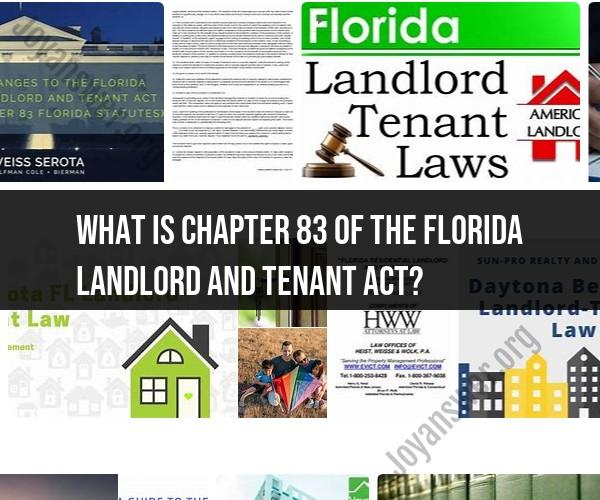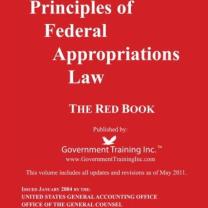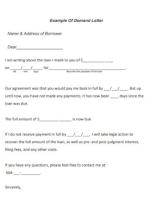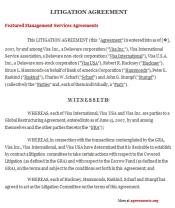What is Chapter 83 of the Florida landlord and Tenant Act?
Chapter 83 of the Florida Statutes is indeed known as the "Florida Residential Landlord and Tenant Act." It is a set of state laws that govern the rights and responsibilities of landlords and tenants in residential rental properties in the state of Florida. The act covers various aspects of the landlord-tenant relationship, including rental agreements, security deposits, eviction procedures, and more. Here are some key points and topics covered under Chapter 83 of the Florida Residential Landlord and Tenant Act:
Rental Agreements:
- The act outlines the requirements for rental agreements, including what should be included in written leases and their terms.
- It also specifies the rights and duties of both landlords and tenants.
Security Deposits:
- Chapter 83 provides guidelines for the collection, holding, and return of security deposits.
- It outlines the procedures for notifying tenants of the use of security deposits and any deductions made.
Landlord's Access to Property:
- The act defines the circumstances under which a landlord may enter the rental property and the notice required for such entry.
Repairs and Maintenance:
- The landlord's responsibilities for maintaining the rental property and making necessary repairs are specified.
- Tenants have the right to request repairs and withhold rent under certain conditions if repairs are not made.
Termination of Rental Agreements:
- The act details the procedures and grounds for terminating rental agreements, including eviction processes.
- It covers situations such as non-payment of rent, lease violations, and other reasons for eviction.
Tenant Remedies:
- Tenants have rights and remedies if landlords fail to meet their obligations under the act.
- These remedies may include withholding rent, repairing and deducting, or terminating the lease.
Landlord Remedies:
- Landlords have legal avenues to pursue eviction and damages if tenants violate the terms of the rental agreement.
Retaliation:
- The act prohibits landlords from retaliating against tenants who exercise their rights under the law.
Fair Housing:
- The act incorporates federal fair housing laws and prohibits discrimination based on protected characteristics.
Chapter 83 of the Florida Residential Landlord and Tenant Act is essential for both landlords and tenants in Florida to understand their respective rights and responsibilities. Keep in mind that the specific provisions and regulations may be subject to updates and changes, so it's important to refer to the most current version of the statute or consult with legal counsel for guidance on specific landlord-tenant issues in Florida.
Decoding Chapter 83: A Close Look at Florida's Landlord and Tenant Act
Chapter 83 of the Florida Statutes is the state's Landlord and Tenant Act. This law establishes the rights and responsibilities of landlords and tenants in Florida.
The Landlord and Tenant Act covers a wide range of topics, including:
- Security deposits
- Rent increases
- Maintenance and repairs
- Eviction procedures
- Tenant rights to privacy
Tenant Rights in Florida: Understanding Chapter 83 of the Law
Under Chapter 83, tenants in Florida have a number of important rights, including:
- The right to a safe and habitable dwelling unit
- The right to privacy
- The right to be free from discrimination
- The right to notice before a rent increase or eviction
Florida Landlord Laws: Navigating Chapter 83 and Tenant Protections
Landlords in Florida also have a number of rights and responsibilities under Chapter 83. For example, landlords must:
- Provide tenants with a safe and habitable dwelling unit
- Make necessary repairs to the dwelling unit
- Give tenants proper notice before entering the dwelling unit
- Follow proper eviction procedures if they want to remove a tenant from the property
If you are a landlord or tenant in Florida, it is important to understand your rights and responsibilities under Chapter 83. You can find more information about the Landlord and Tenant Act on the Florida Department of Agriculture and Consumer Services website.
Here are some additional tips for navigating Chapter 83 and tenant protections in Florida:
- Landlords: Be sure to provide your tenants with a copy of the Landlord and Tenant Act when they move in. This will help to ensure that both parties understand their rights and responsibilities.
- Tenants: If you have any questions about your rights as a tenant, you can contact the Florida Department of Agriculture and Consumer Services for assistance.
- Both landlords and tenants: If you have a dispute, you should try to resolve it amicably first. If you are unable to resolve the dispute on your own, you may need to file a lawsuit in court.
Here are some examples of tenant protections in Florida:
- Tenants have the right to a 30-day notice before a rent increase.
- Tenants have the right to a 15-day notice before a landlord enters the dwelling unit.
- Landlords must provide tenants with a safe and habitable dwelling unit. This includes making necessary repairs to the property and providing tenants with access to running water and electricity.
- Tenants cannot be evicted without proper notice and a court order.
If you are a landlord or tenant in Florida, it is important to understand your rights and responsibilities under Chapter 83. This will help to ensure that you are treated fairly and that you have a positive rental experience.











